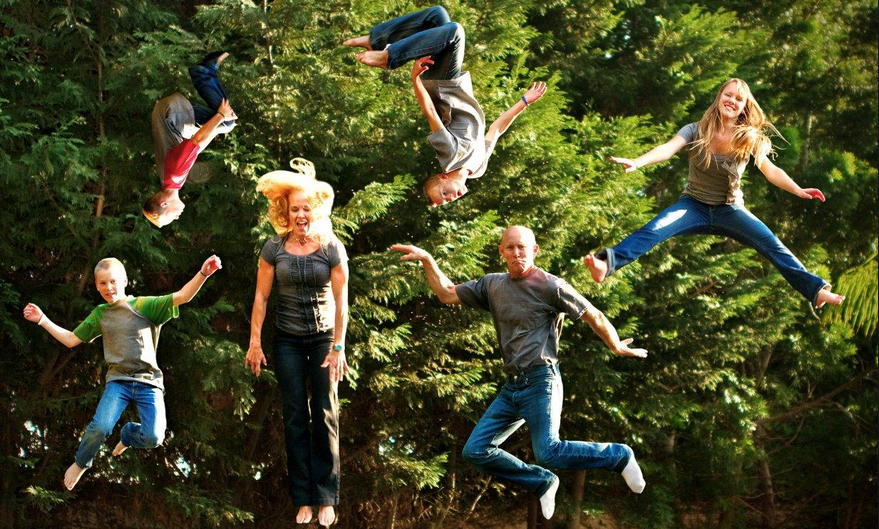
Eat, Move, Sleep and 3 Other Daily Keys to Becoming A Healthier Family.
How does a family become healthier every single day? By that I mean cultivating the all-round wholeness of interpersonal connection, of body, of mind and of soul.
There is something about the pace and busyness of life nowadays that mitigates against healthiness in families. So many of us have forgotten that pursuing achievement (such as adult career success, or academic and extra-curricular pursuits in kids) while neglecting a prior and more basic pursuit of wholeness will only lead to implosion of lives and families.
I have seen enough families in which many members are hitting it out the park in financial or schooling success, but are nevertheless failing in something far more essential: a family culture that daily garners wholeness in all.
What does this wholeness entail?
I first got thinking about this when I read Marcus Buckingham’s book ‘Eat, Move, Sleep’. He postulated that daily habits of good nutrition, aerobic exercise and catching enough Z’s are the secret to health and longevity. His strap line is memorable: Small choices that make big changes.
After 2 years of fiddling around with the idea that there are basics of wholeness, I have added 3 more to Marcus’ list of 3, that are every bit as foundational.
(Spoiler alert, I got 2 more ideas from the title of Elizabeth Gilbert’s Eat, Pray, Love but I didn’t draw at all on her definition of those words.)
The power of daily habits
What makes these 6 activities so powerful is that they can plausibly be done almost every day!
In fact, that’s the secret to a great life.
What, after all, is a year?
It’s just 365 short sprints.
The habits we build into each sprint become our life.
As I said before, we’re just as likely to default to positive habits, such as eating a healthy breakfast or doing exercise, as we are to self-sabotaging ones. We are all by nature creatures of habit. The problem is that if we are not intentional about forming good habits, we will resort to bad ones.
As such Julie and I, still in the shallow end of this conviction, are trying to work on 6 things in our daily family life, thereby encoding into our children a love for all-round wholeness. We hope that one day even our grand kids will benefit as our kids carry this on as their freely chosen adult way of daily life.
What are the secrets and habits to family and personal wholeness? There are six…
1. Eat.
Every day, feed your kids healthy food, and feast as a family around something healthy.
Not only does a good combo of healthy foods improve their health and behaviour now, research says that what we feed our kids usually sets in motion a lifestyle of eating that they carry on for life. A kid that eats McDonalds once a week becomes an adult that eats McDonalds once a week.
Some ideas to do this.
I have plenty of do-able ideas here – none of which will cost an arm and a leg. It includes things like widening your family’s protein intake beyond meat, eating more of the good grains, enjoying more veggies and fruit, herbs and spices, ingesting the right dairy and spreads, and radically reducing sugar and salt.
There is something to be said for modelling to our kids a taste for the better foods in life. If we prefer eating junk ourselves, we can’t excite them with the good stuff.
Presentation of healthy food is critical. For example, in my house, for the last week, I have daily made a smoothie for my kids filled with the good stuff – avo, carrots, ginger, seeds and, for sweetness, apple and banana. So doing they eat many ingredients they would ordinarily refuse.
One last thought is to eat less animals. By request from two of my kids, we’re trying to cut down our meat intake. Last night, as we do every week or two, we ate a tasty, protein-rich, meat substitute (thanks to Pick n Pay’s section of Fry Family Foods). My kids love it. We also proudly announce, ‘No animals were harmed in the making of this meal.’ Seriously, I believe that in a generation or two our grand kids will reprimand us as the horrible people who used to kill animals for food. They will have enough of an ecological and ethical argument on their side. Best to start making adjustments now.
2. Move.
Every day, make sure your kids get some exercise.
Any chance to get them losing their breath as they chase a soccer ball, a sibling, a parent or a butterfly should be encouraged.
Sedentariness in kids, connected to screen-addiction, is at an all time high. Evidence shows that the older we get, the less we move everyday, so it only gets worse as our kids climb up the age-ladder.
The good news is that kids can be hooked on soul-nourishing, exercise-related endorphins every bit as much as they can on soul-sapping, dopamine-releasing video games.
Some ideas to do this.
Model the priority of exercise in your own life, not as something you have to do, but as something you get to do.
For many months this year a few of the kids joined me in the mornings doing 7 minutes of fun exercise guided by this app.
A few times a week we jump in the car at 5pm and hit a nearby green-belt, park or garden. (I must admit that, other than my surfing, Julie and I’ve been at a low in terms of regular exercise – unless running after 5 kids for hours every day counts.)
Although, we’ve stopped letting our kids play with the iPad use in the last many months, I used to make my older kids earn 15 minutes of playtime by doing 15 minutes of trampoline first. I’m a loving tyrant that way.
3. Sleep.
The sleep foundation recommends 11-14 hours of sleep for toddlers, 10-13 for preschoolers, 9-11 for 10-13 year olds, and 8-10 for teens, and 7-9 for adults.
Waking time is catabolic (our body and brain break down), while sleep time is anabolic (our body and brain renew and rebuild). Our culture has long known that nutrition and exercise are secrets to health, but it has only recently discovered that sleep is the secret sauce, apart from which the other 2 don’t work that well.
My buddy used to say, ‘I will sleep when I die.’ Actually, you will die much sooner if you don’t sleep. Sleep is not an impediment to a full life. In fact, it’s the way to one. A single night of sweet sleep rewards us with a day’s worth of increased memory, immuno-defence, emotional robustness and mental sharpness.
Reading this book last month fully converted me to the joy of prioritizing my mattress. Seriously, Julie and I are – for the first time ever – ‘working’ on our sleep habits. All those years of burning the candle at both ends proves we’re not nearly as bright as we thought we were.
Some ideas to do this.
As a coffee-lover, I don’t touch the stuff after lunch. (Did you know that after 8 hours, 50% of it is still in your blood, guaranteed to affect the depth of your REM cycles. Sure the adrenaline released by caffeine might boost your sprint today, but by affecting your sleep quality, it slows your sprint down even more tomorrow.
Us dads and moms need to rave about sleep to our kids. They should regularly overhear us saying, ‘I’m so looking forward to sleeping tonight!’
We can help our kids form better sleep preparation habits by making sure they avoid haphazard sleep times, screens 60 minutes before sleep, bright light (especially blue-based light) before bed time, and over-hot blankets – all of which deter good sleep.
4. Play.
Every day, make sure your kids do stuff for the fun of it.
In the West (and actually much more so in the East!) we’ve been systematically reducing daily play-time from the life of kids. And it’s almost absent in us success-driven, productivity-addicted adults.
Brene Brown in The Gift Of Imperfect Parenting reminds us that the opposite of play is not work. It’s depression.
Some ideas to do this.
We must create time to have fun. Busyness eats into the unstructured use of time wherein play can thrive.
We must not confuse the soul-numbing thrills of screen-entertainment for the revitalizing real thing of technology-free play. Entertainment is very different to recreation.
We need to ask our spouse and kids the questions:
- What do you like doing that makes you lose track of time?
- What do you enjoy doing so much that you don’t want it to end?
- How often do you just goof off, and forget about all the things that have to get done?’
In my house, our living space usually has an open box of lego, and a pile of papers next to pencils and papers – it’s amazing how often our kids get into a creative space as a result. (Unfortunately, almost every wall has crayon marks on them. When we try to track down the culprit, the older ids point to the twins, who point to each other! When everyone’s 8 we’ll repaint our house.)
We’ve been lucky enough to have a garden which has been turned to a wonderland – there is a zipline, tree-house, trampoline, stand-up swing and plenty of lie-around tyres. Thanks to my DIY friends who made this possible.
Also, there’s the dance-like-crazy times where the music blasts and I remind our kids by my example that we don’t do cool in this family, we do crazy fun. On the way to school this morning, Ivy (4) asked me, ‘Daddy, can you and me do ballroom dancing again tonight?’ Gush. Only a dad knows the feeling.
5. Pray.
Every day, talk about some aspect of faith with your kids.
Those of you with no faith, or other faiths, respect.
I can’t speak for your translation of this point into your own situation.
But I can say that Julie and I have found that our Christian faith is not only a great conductor of family values, and a glue that can hold people together, but it also seriously boosts resilience in the face of adversity – in both us adults and in our kids. As for physical health, there’s plenty of evidence for the faith-health connection.
Some ideas to do this.
Julie and I try to grab 30 seconds here and there to pray for our family. At bed-time we pray for and sometimes with our kids.
In faith-based families, there is plenty of research to reveal that there is actually a silver bullet that safeguards a marriage: it’s the couple praying together regularly. Pray together to stay together, is how preachers sometimes put it.
I find that mornings and bedtimes create natural opportunities for faith-transfer to our kids: Most mornings (lately at least) I blast the Planetshakers playlist through the house. And I read a Scripture to my kids as I hand out smoothies.
Bed-time is a chance to read Bible stories to them, and to discuss matters of faith on the points where they touch our kid’s lives. Raising digi-natives, I also supplement these times with technology (with dimmed, yellow-light settings on):
- for kids aged 2-4, it’s the free and phenomenal Kids Bible app,
- for kids aged 5-7 it’s the Jesus Storybook Bible (see these videos as a sample),
- for older kids we watch and discuss these.
There’s also church on Sundays. The family-orientated church we’re part of organizes its Sunday services around the idea that church should be enjoyed not endured. Not surprisingly, my kids can’t wait to go every week.
6. Love.
Every day, connect with each other in a loving way.
Even though my family so often feels repetitive (it’s Groundhog day Monday to Thursday), chaotic (5 kids and 2 working parents) and battle-worn (with each kid surrounded by another 4, sibling conflict is inevitable) my kids often enough say that nothing matters to them more than their relationship to everyone in our dizzying family.
The greatest predictor for physical health, longevity and even happiness is not a good diet, or regular exercise. It’s close relationships that are weekly, if not daily cultivated and celebrated. It’s people spending time with each other, and being ready to open each other’s hearts to one another.
Some ideas to do this.
I suck at this, but I am trying to stay more in touch with Julie via calls and whatsapps throughout the day. (Steven Covey in 7 Habits of Effective Families made a big thing about this.)
As for after-work, most days, Julie and I do our best to:
- say a warm hi to everyone as we return home,
- ignore our smartphones from 5pm till our kids are asleep,
- have a family dinner conversation,
- be ready for cuddles while looking for opportunities for heart-to-heart chats at bed-time.
For Julie and I, straight after kids bed-time we try to touch base to discuss how to best use the rest of the night. We’ve found that too many nights in a month of work, surfing the web, or watching series or DVDs tends to erode the quality of our sleep, our emotional closeness, and the regularity of our ‘romantic’ life.
One of the things I’ve realized is that we can do 2 or more of these 6 activities at a single time. For example, if I give my kids a smoothie in the mornings, then I read an inspiring Scripture, then we each toast each other about something we are grateful for, that’s eat, pray and love all in one go.
In fact any of them that are done together, strengthen the connections between us. Where possible, don’t just eat or move or pray or play on your own. Do them together.
The super six
Six simple verbs.
Eat. Move. Sleep. Play. Pray. Love.
Try memorize the list.
Each is an irreplaceable ingredient to health, happiness and life-long joy.
Sure, we and our kids may have been very productive on any given day, rushing from this to that, scratching off items on a to-do list, but that’s not the way of wholeness and health.
But if we fail to build our family around these six fountainheads of life-long vitality and sustainability, the trophies of success are hardly worth it.
Perhaps, at day’s end, you (and your spouse?) can ask yourselves 6 simple questions to evaluate how well you did this day as a family:
1) Eat: Did we and our kids get sufficient nutrition today?
2) Move: Did we and the kids get some exercise?
3) Sleep: Have we set up our kids and ourselves for a good night of sleep?
4) Play: Did we and our kids have some fun today?
5) Pray: Did we model and find natural opportunities to pray or talk about our faith with our kids today?
6) Love: Did we fortify our emotional connections with each other as a family today?
To be honest with you, if we get just 4 out of 6 most days, I call that a win.
But when we remember what is at stake – life-long wholeness and a lifestyle that our kids will likely take with them for decades to come – there is no harm in shooting the lights out on this one, by figuring out how to get 6 out of 6 tomorrow.
And the next day.
And the next.
Comments
Also published on Medium.




